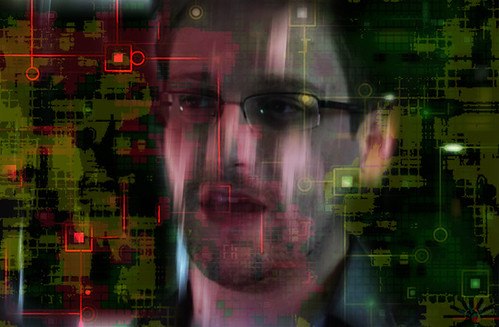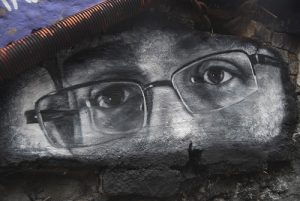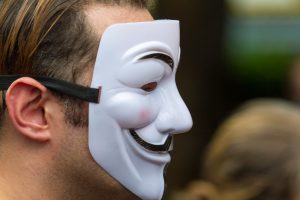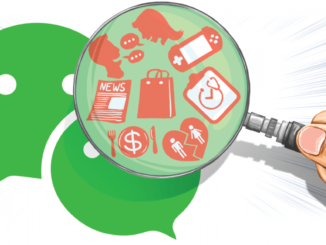
Author: Anqi (Angela) LI | Sid: 500008469 | Class: RE02 | Tutor: Yuan JIANG
8 years have past, since Edward Snowden blow the whistle on the government of the United States as well as its intelligences by revealing classified information about the PRISM Program to the Guardian and the Washington Post(Lee, 2013). Edward Snowden is now living in Russia by claiming political asylum and has recently applied for Russian citizenship for sake of his future son (Roth, 2020). Whether Edward Snowden is a traitor to the government he served for, or a hero of the era has been widely debated. However, this article is going to focus on analyzing the reflection and takeaways of the incident on the topic of Internet transformation and information security by reviewing Snowden (Fitzgerald et al., 2016).

“Prism Reflections 1877” by sburke2478 is licensed under CC BY 2.0
‘De Oppresso Liber’
The PRISM Program and Edward Snowden Who Reveal It to the Public
The government is watching you – every time you send an email, access a web page, search something on Google, or even when you strip your clothes without covering the camera of your laptop. This might sound insane, since almost everyone is using the internet nowadays. The number of active internet users worldwide has reached 4.66 billion in the January of 2021, which is 59.5 percent of the global population (Statista, 2021). But it has also been proved to be true, after the 29-year-old genius hacker who used to work for the United States National Security Agency (NSA) and the Central Intelligence Agency (CIA) revealed the secret surveillance program authorized by the government of the United States (Lee, 2013).

“Snowden Effect – What is metadata?” by DonkeyHotey is licensed under CC BY 2.0
The PRISM Program is a topic-secret digital surveillance program run by the NSA since 2007 (Lee, 2013). According to Greenwald and MacAskill (2013), the PRISM Program involves an in-depth surveillance of instant messages and existing data, including 10 main categories of information: emails, online messaging, video, photos, stored data, voice chat, file transfers, video conferencing, login times and social network profiles, all of which are monitored in detail by the government in the name of anti-terrorism (Greenwald & MacAskill, 2013). The scope of the PRISM Program is extensive, with data obtained directly from the internet service providers in the United States, including Microsoft, Yahoo, Google, Facebook, Pal Talk, YouTube, Skype, AOL and Apple (Greenwald & MacAskill, 2013).
Snowden (Fitzgerald et al., 2016)
The film Snowden is a dramatization of actual events, which documented the life of Edward Snowden before and after he was recruited by CIA and NSA (Fitzgerald et al., 2016).
<iframe width=”560″ height=”315″ src=”https://www.youtube.com/embed/PpXleBMkWlo” title=”YouTube video player” frameborder=”0″ allow=”accelerometer; autoplay; clipboard-write; encrypted-media; gyroscope; picture-in-picture” allowfullscreen></iframe>
SNOWDEN: CIA Interview scene movie clip (Source: https://youtu.be/PpXleBMkWlo)
The phrase ‘De oppresso liber’ occurs at the very beginning of the film. It was Snowden’s answer when he was asked of why he wanted to be in the Special Forces during his first job interview with the CIA (Fitzgerald et al., 2016). ‘De oppresso liber’ is the motto of the United States Army Special Forces, which is often translated into ‘to free from oppression’, or ‘to liberate the oppression’ (Fabian, 2020). It turns out that Snowden does liberate the oppression after all, as he returned the truth about government surveillance programs to civilians who were unknowingly being monitored.

“Edward Snowden eyes DDC_8315” by Abode of Chaos is licensed under CC BY 2.0
The Sword of Damocles
The Ironic Loop of the Internet
During World War II, governments started to pay attention to the importance of computing power and technology which allows rapid processing and sharing of information (Smith, 1998). In the context of the Cold War, the forerunner of the Internet was the Advanced Research Project Agency Network (ARPANET) established in between the 1950s to the early 1960s which allows the connection of the computing network of many Universities and research institutions in the United States (Goggin, 2014). One of the initial major priorities of the internet, despite connecting different networks, was to develop a decentralized communication network that could survive nuclear attack (Smith, 1998). It is reasonable to suggest that the Internet was born in the context of War and had an inevitable and inherent connection with the military force, as the original use of the internet was to enhance military power and national defense.

“Macbook Pro Keyboard” by eGuidry is licensed under CC BY 2.0
Later, the internet has gradually developed its use as communications medium between users who are not from universities or research institutions and became increasingly commercialized in mid-1990s (Goggin, 2014). Although it might be contradicted to the trend of commercialization, the internet always sticks to its core principle, which is content sharing and collaboration. Since then, the internet is often seen as the symbol of individual liberation and personal freedom, instead of bureaucratic oppression and control (Lusioli & Turner, 2021). However, the PRISM Program revealed by Snowden ironically represents the government using the Internet as the tools to oppress and control its citizens.
Fish in the Water
“One thing about which fish know exactly nothing is water, since they have no anti-environment which would enable them to perceive the element they live in.”
(McLuhan, 1964)

“Georgia Aquarium Fish” by Mike Johnston is licensed under CC BY 2.0
McLuhan (1964) compared media consumers to fish in the water, which indicated that people are living and soaking in media before they could even realize. The internet has become a necessity in modern life and a mobile device that allows access to the internet is like one of the organs of the human body. Nowadays, everything could be done online, as there are digital platforms for almost everything in this post-digital media era. It is incredibly convenient to use Airbnb for housing, Uber for transporting, Deliveroo for ordering food, Amazon for shopping and Netflix for entertaining. More importantly, it is much more convenient so much than doing these things in the traditional way. As a result, people hardly realize that they are consuming media products and that they are becoming addicted to the internet.

“匿名者 Anonymous (Guy Fawkes Mask) / 香港聲援斯諾登遊行 Hong Kong Rally to Support Snowden (SnowdenHK) / SML.20130615.7D.42258” by See-ming Lee (SML) is licensed under CC BY-NC 2.0
The internet is the easiest tool to gather and store all its users’ digital footprint contains personal secrets and privacies, which is without doubt the most wanted content for a government to collect and monitor. Therefore, Internet has become the Sword of Damocles hanging on the head of every user, as every word and every action of every user could be secretly watched by a stranger, or worse.
So, will you cover your laptop camera after reading this article, just like Snowden did?
Reference List
Fabian, S. (2020). Taking ‘De oppresso liber’ to the streets: why the U.S. Army’s Special Forces qualification course needs to become more urban. Modern War Institute at West Point. From: https://mwi.usma.edu/taking-de-oppresso-liber-to-the-streets-why-the-us-armys-special-forces-qualification-course-needs-to-become-more-urban/
Fitzgerald, K., Stone, O., Gordon-Levitt, J., Woodley, S., Leo, M., Quinto, Z., Harding, L., & Kucherena, A. (2016). Snowden. Distributed by Buena Vista Australia.
Goggin, G. (2014). The internet, online and mobile communication. [Chp.14]. In S. Cunningham & S. Turnbull (Eds.), The Media and Communications in Australia, 4th edition (pp. 247-267). Crows Nest, Australia: Allen & Unwin.
Greenwald, G. & MacAskill, E. (2013). NSA Prism program taps in to user data of Apple, Google and others. The Guardian. From: https://www.theguardian.com/world/2013/jun/06/us-tech-giants-nsa-data
Johnson, J. (2021). Global digital population as of January 2021. Statista. From:https://www.statista.com/statistics/617136/digital-population-worldwide/
Lee, T. B. (2013). Here’s everything we know about PRISM to date. The Washington Post. From: https://www.washingtonpost.com/news/wonk/wp/2013/06/12/heres-everything-we-know-about-prism-to-date/
Lusioli, A. & Turner F. (2021). “It’s an Ongoing Bromance”: Counterculture and Cyberculture in Silicon Valley—An Interview with Fred Turner. Journal of Management Inquiry 30(2), pp. 235-242.
McLuhan, M. (1964). Understanding media: the extensions of man. Routledge & Kegan Paul.
Roth, A. (2020). Edward Snowden applies for Russian citizenship for sake of future son. The Guardian. From: https://www.theguardian.com/us-news/2020/nov/02/edward-snowden-applies-for-russian-citizenship-for-sake-of-future-son
Smith, K. A. (1998). Where Wizards Stay Up Late: The Origins of the Internet. Journal of Engineering Education (Washington, D.C.), 87(3).

A Film Review of Snowden by Anqi (Angela) LI is licensed under a Creative Commons Attribution 4.0 International License.


